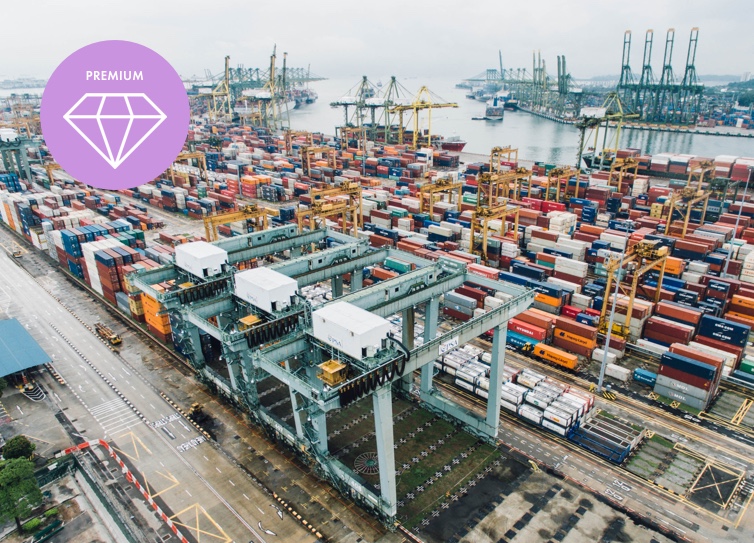
June 2, 2020

Helen Castell is a freelance journalist and editor with nearly 20 years’ experience as a financial journalist, specialising in trade finance, commodities, energy and international development.
COVID-19 has shaken the world economy to its core, bringing chaos, uncertainty and pain to supply chains in almost every sector and geographical market. But while the challenges facing global trade are very real – and the human cost of the pandemic is rightly front of mind – the financial services sector has a responsibility, and an opportunity, to keep trade flowing and help otherwise viable companies survive the storm.
The months ahead will see numerous businesses fail, but there will also be survivors and even successes. Many in the healthcare, grocery, online retail and technology sectors, for example, are already enjoying demand upticks that they will only be able to capitalise on – and hopefully sustain post-crisis – if their own suppliers also stay healthy.
The readiness of working capital providers to support these firms with fresh liquidity is already being put to the test, as is the ability of technology innovations that some have invested in to provide the transparency and efficiency that is now needed more than ever.
Rush for liquidity
Demand for cash has soared in recent months, with firms across the globe – from smaller businesses to investment-grade names – rushing to stockpile liquidity to ensure they can pay bills and buy inventory if revenue and other sources of credit dry up. In the US, for example, firms drew an unprecedented $162 billion from existing revolving credit facilities in the final three weeks of March, also tapping another $26.1 billion in new revolvers and loans, according to Bloomberg data.
Buyers are also seeking more time to pay suppliers, which are simultaneously requesting early payment from customers to help them survive or even grow throughout the crisis – creating a financing gap that represents an opportunity for working capital and supply chain finance providers. US fintech Taulia, for example, says its platform experienced a more than 200% surge in early payment volumes for suppliers in March, while funders like Citigroup and Greensill have predicted demand for supply chain finance will outstrip availability in the months ahead.
At the same time however, fears of credit downgrades or fraud have spooked traditional lenders, with numerous banks taking a more cautious approach to supply chain lending that has traditionally been core to their transaction banking business.
Although this process was already underway pre-COVID – with insufficient investment in automation at some banks rendering what is a relatively low-margin, high-volume business increasingly less attractive – the trend has accelerated sharply this year. The UK’s Lloyds, for example, reportedly closed its supply chain finance book to new business in March, citing the heightened risk of fraud that often accompanies economic downturns. Others have withdrawn even from pre-existing programmes.
Helping supply chains survive
The benefits that receivables-backed working capital finance brings to corporates – especially during times of downturn or business disruption – are well documented.
In a supply chain finance programme, a financial intermediary effectively lends a big buyer or importer working capital that is then funnelled to its various suppliers in the form of early – and sometimes even pre-shipment – payments for their invoices.
Such programmes enable suppliers – which pay for the service in the form of a ‘discount’ or percentage of the value of invoices that are settled early – to buy parts or raw materials they need to keep producing and stay in business. This can prove a vital lifeline at times when such suppliers’ orders and revenue take an unexpected hit or logistical challenges trigger shipment delays. And because the original funding for the programme is lent to the buyer on the back of its typically stronger credit rating, the discount the supplier pays is usually smaller than the interest they would be charged if they were to try and borrow working capital directly.
For buyers, these programmes sometimes enable them to extend payment terms with suppliers, freeing up working capital for other purposes, although this has proved controversial. Automation of invoice payment processes also improves efficiency and can help buyers trim their finance department staffing costs.
Most importantly, supply chain finance hands buyers stronger security of supply. During sharp downturns or times of crisis – such as the one now crippling many sectors – it can help buyers support struggling suppliers whose goods and services will be crucial to their own revival once trading conditions improve. Those suppliers that are left standing after a storm are often inundated with orders at this point – not all of them they are able to fulfil – and buyers that invested in the relationship during tough times will find themselves closer to the front of that queue. Deciding which suppliers’ goods are most critical to a buyer’s own production or business – and therefore which suppliers to prioritise with better payment terms or supply chain finance – is therefore a process that many big names will be going through now.
Buyers in the UK food industry, for example, have embraced this principle in recent months, rushing to support suppliers as the pandemic knocks otherwise viable businesses sideways. A toxic mix of logistic disruptions and restaurant closures have dragged many food suppliers close to collapse but also opened new opportunities for those that are able to respond quickly to spikes in demand from supermarkets and delivery services.
Supermarket chain Morrisons attracted praise in mid-March when ahead of a country-wide ‘lockdown’ it pledged fast and even pre-payment to small farmers and other suppliers. While the group’s motives were understandably more pragmatic than charitable – with its CEO noting at the time that the chain was heavily dependent on the ability of such suppliers to function smoothly and manage supply chain disruptions – the approach has helped it keep shelves full and tills ringing during a period of immense profit opportunity for big grocers.
In contrast, a handful of big fashion retailers that reportedly stung suppliers with harsher payment terms and order cancellations as their own revenue dried up may struggle to compete with more supportive buyers for inventory once stores reopen, especially if their old suppliers have gone bust.
Tech-savvy specialists best positioned
This creates a window of opportunity for working capital and supply chain finance specialists to increase their market share. Tech ‘disruptors’ armed with innovative solutions and automation capabilities able to cut programme costs, tackle fraud and inject more transparency into the process will be best positioned to benefit. The coronavirus pandemic has, for example, made the digitisation of trade finance more critical than ever, as office shutdowns and home working slow the processing of paper-based documentation to near standstill.
Critics have often argued that supply chain finance is vulnerable to fraud even during uptrends, given the complexity of many trade finance programmes as well as their reliance on the veracity of invoices. Working capital providers that boast tech solutions for identifying and preventing potential fraud ability will therefore find fresh opportunities in current market conditions.
Aronova’s approach is to leverage tech tools to analyse the historical behaviour of buyers and sellers in a programme, flagging any anomalies for further investigation. It taps a database of over 300 million businesses globally to verify the identity of counterparties in each transaction and applies eligibility criteria for every new invoice and obligor to protect all parties against the risk of unwanted liabilities.
Distributed ledger technology also holds promise, with several providers launching blockchain-powered solutions to streamline documentation processes, eliminate the need for third parties in cross-border payments or enable local currency payments to suppliers. China Everbright Bank, for example, announced in March it has partnered with Alibaba’s Ant Financial to implement a blockchain-based supply chain finance platform.
Now is also prime time for both banks and supply chain finance specialists to grow existing programmes by onboarding a larger pool of suppliers and investing in automation. This helps finance providers and the corporates they serve benefit from the economies of scale and efficiencies that bigger programmes bring.
As with any financial service, supply chain finance is not without its risks. Ratings agencies have, for example, warned in recent weeks that the pandemic may tempt buyers to use the tool to beautify their balance sheets and hide unsustainable debt levels. While there is little evidence that this has happened yet, their comments underscore the importance of transparency, not least during testing times. Supply chain finance may be enjoying its moment in the sun, but with this comes a responsibility to prove such fears unfounded.
Tags: Supply Chain
Subscribe for premium content
To continue reading premium content like this and to receive future notifications about articles from Aronova please sign up to receive our marketing communications.





